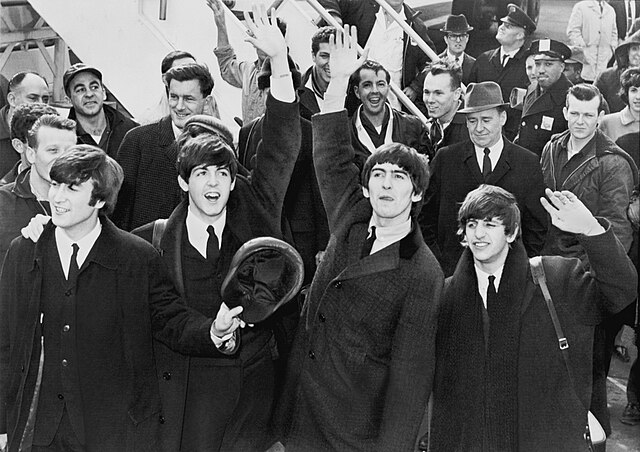Progressive pop is pop music that attempts to break with the genre's standard formula, or an offshoot of the progressive rock genre that was commonly heard on AM radio in the 1970s and 1980s. It was originally termed for the early progressive rock of the 1960s. Some stylistic features of progressive pop include hooks and earworms, unorthodox or colorful instrumentation, changes in key and rhythm, experiments with larger forms, and unexpected, disruptive, or ironic treatments of past conventions.
The Beatles working in the studio with their producer George Martin, circa 1964
ELO performing in 1986. Frontman Jeff Lynne was one of prog-pop's "signature architects".
Pop music is a genre of popular music that originated in its modern form during the mid-1950s in the United States and the United Kingdom. During the 1950s and 1960s, pop music encompassed rock and roll and the youth-oriented styles it influenced. Rock and pop music remained roughly synonymous until the late 1960s, after which pop became associated with music that was more commercial, ephemeral, and accessible.
The Oxford Dictionary of Music states that the term "pop" refers to music performed by such artists as the Rolling Stones (pictured here in a 2006 performance).
Amr Diab, Egyptian pop star, named "El-Hadaba", for achieving high records sales in the Middle East and Africa for the last three decades
Bing Crosby was one of the first artists to be nicknamed "King of Pop" or "King of Popular Music".[verification needed]
The 1960s British Invasion marked a period when the US charts were inundated with British acts such as the Beatles (pictured 1964).





![Bing Crosby was one of the first artists to be nicknamed "King of Pop" or "King of Popular Music".[verification needed]](https://upload.wikimedia.org/wikipedia/commons/thumb/4/4d/Bing_Crosby_1930s.jpg/480px-Bing_Crosby_1930s.jpg)
